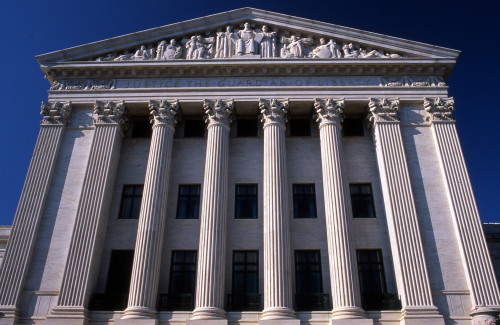The Supreme Court has heard oral arguments in a case that could result in Pagan organizations becoming eligible for state and federal grant monies.
The case, Trinity Lutheran Church of Columbia v Comer, revolves around a Missouri-based church that applied for a state grant to resurface its playground. The state of Missouri had originally decided that religious schools were not eligible to receive state grant funds. However, after the lawsuit was underway, the state reversed that decision and will now allow religious schools to participate in that program going forward.

Supreme Court. [Image: Wikimedia Commons]
Issues to be decided
The main issue the court appears to be grappling with is if religious organizations can be discriminated against versus other types of non-profits. Under the law, religious non-profits are viewed as one type of non-profit organization. In this case, the preschool was excluded from the playground resurfacing program because it was run by a church. But is this specific type of discrimination allowable under the Constitution?
The state’s attorney argued that the playground is part of the ministry of the church, and that states have to avoid giving the appearance of sponsoring a specific religion by funding improvements to church properties.
The church’s attorney argued the playground isn’t used for religious purposes; it is used the same as any non-profit playground; a place for children to play. As such, the organization was unfairly discriminated against when they were denied the state grant for resurfacing.
In addition, the church’s attorney listed a variety of federal grants that religious organizations already receive, such as a Department of Homeland Security monies to assist with security at high risk targets such as mosques.
A second issue being considered is if grants and programs, such as the playground resurfacing, are a general benefit or a selective benefit.
Churches and religious organizations currently receive general benefits such as police and fire services. The roads to and from the church are built and maintained through tax dollars. Water and sewer infrastructure, in places where these services are provided by government, are also provided to churches. General benefits are infrastructure or services that are available to everyone.
Selective benefits are infrastructure or services that are only government provided based on a select, but neutral, criteria. This could be programs for low income persons to raise their credit scores or for the creation of shelters for women escaping abuse.
Missouri argued that the program was a selective benefit available to non-religious schools. The church argued this was a general program that was open to everyone, but unfairly excluded schools owned by religious groups.
Potential affects on Pagan organizations
If SCOTUS rules that religious non-profits are to be treated the same as other non-profits when it come to applying for government programs and grants, as long as the monies aren’t being used for ministry, this could open up new sources of funding for Pagan organizations. An example would be Circle Sanctuary who could apply for state and federal programs which support the naturalization of wildlife refuges. The New Alexandrian Library could apply for the Preservation Assistance Grant, a program which funds the preservation and conservation of collections.
Projected outcome
SCOTUS watchers expect the court to be divided on the subject with new Justice Neil Gorsuch casting the tie breaking vote. After hearing oral arguments, it appears more members of the court are leaning toward opening government funding to religious organizations. SCOTUSBlog reports that only two justices, Ruth Bader Ginsburg and Sonia Sotomayor, appear to be firmly supporting Missouri’s position. The other seven justices seem to be either firmly supporting the church’s position or leaning in that direction.
The court is expect to issue a ruling in June.
The Wild Hunt is not responsible for links to external content.
To join a conversation on this post:
Visit our The Wild Hunt subreddit! Point your favorite browser to https://www.reddit.com/r/The_Wild_Hunt_News/, then click “JOIN”. Make sure to click the bell, too, to be notified of new articles posted to our subreddit.
